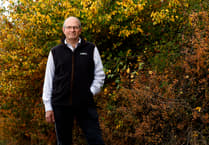Over 840 litres of harmful pesticides and chemicals from farms across Devon as well as Cornwall were safely collected and disposed of last year to help protect the environment and natural water quality.
The work was carried out by Cornwall Wildlife Trust and Westcountry Rivers Trust, through funding from South West Water’s pioneering catchment management programme, Upstream Thinking, with further collections already underway for this year.
The pesticide amnesty encouraged farms to hand in unwanted, outdated or banned chemicals so they could be safely disposed of and to prevent them from accidentally entering the environment.
Through the scheme, old containers of pesticide were confidentially collected and disposed of for farmers for free, with the aim of promoting cleaner watercourses, healthier ecosystems and safer crop production.
Upstream Thinking works with landowners to look at how land is managed to drive improvements in raw water quality in rivers across the region. It focusses on practical, preventative measures to address problems before they arise.
Over time farmers are becoming much more willing to part with their pesticides.
Carolyn Cadman, South West Water’s Director for Natural Resources, said: “Often farmers hang on to outdated pesticides because they don’t know what to do with them or just don’t get round to disposing of them.
“These old containers can easily crack and lead to accidental spills to the environment. “One gram of pesticide can be detected many kilometres downstream, which shows the importance of reducing potential harm by removing these products from the environment before they soak into the ground and reach the watercourse.”
Annabel Martin, Head of Land Management at Westcountry Rivers Trust, said: “Since 2016, we have collected and disposed of more than 7.3 tonnes of unwanted pesticides, herbicides and insecticides from 117 farms in our Upstream Thinking catchments in Devon and Cornwall. Given the highly mobile nature of these chemicals, it is incredibly important to remove the risk of spills and leaks, even when the river is distant to the farmyard. Providing this service enables farmers to do the right thing by the environment, without the risk of them having to transport the chemicals themselves."





Comments
This article has no comments yet. Be the first to leave a comment.